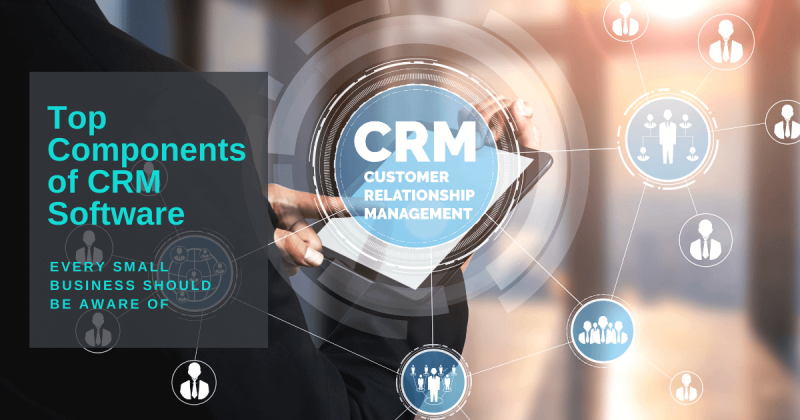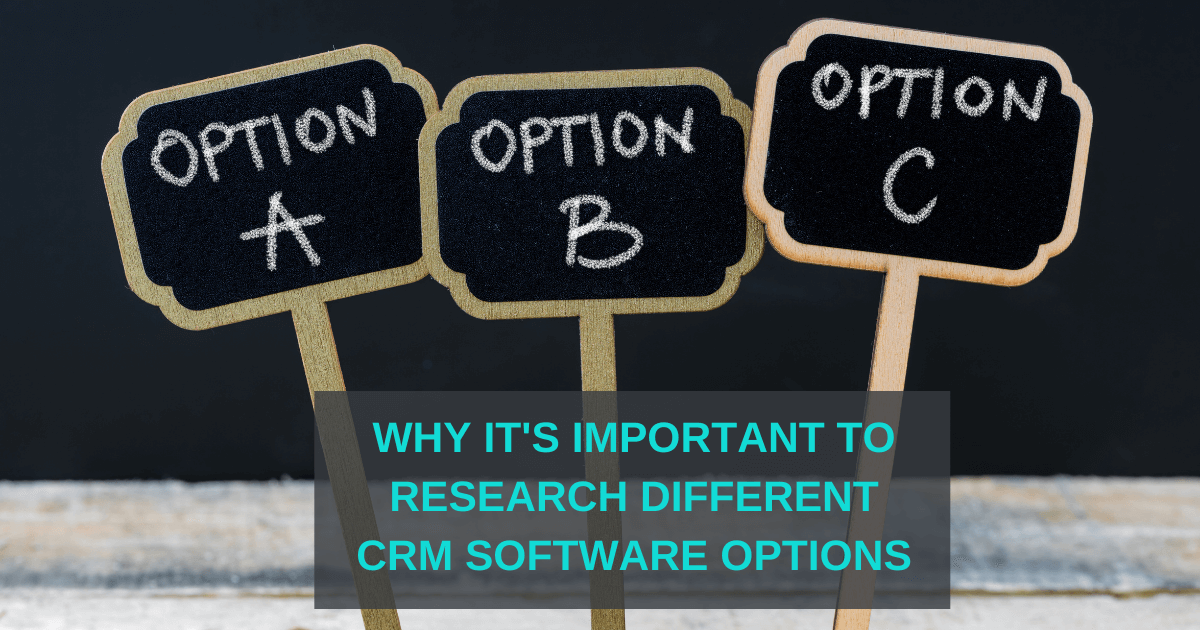
Wondering if you need CRM software?
You’re not alone.
A lot of small businesses are unsure of whether or not they need customer relationship management software.
In this blog post, we’ll outline the top components of CRM software and explain why every small business should be aware of them.
After reading this post, you’ll have a good understanding of what CRM software is and why it’s important for your business.
Why It's Important to Research Different CRM Software Options
When it comes to choosing CRM systems for your business, it's important to do your research and choose a system that includes all the CRM features and functionality you need. With so many different CRM software options on the market, it can be difficult to know where to start.
To help you narrow down your options, we've put together a list of the 13 essential components of CRM software that every business should be aware of. By making sure your CRM system includes all of these components, you can be confident you're getting a powerful tool that will help your business grow and succeed.
What Are the Different Components of CRM Software?
CRM software is comprised of several components, and each one plays a vital role in keeping your customers happy and engaged with your business.
Let’s take a closer look at each individual component.
1. Customer Management
This is the heart of CRM software and includes all the features and tools you need to manage your customers.
You can use customer management to keep track of customer data and contact information, such as phone numbers, emails, addresses, account details, purchase history, and communication history.
This information is stored in a central database, so it’s easy to access when you need it.
Customer management is important because:
- It helps you keep track of your customer base.
- It will save you a lot of time by being organized.
- Targets customers with marketing campaigns based on their previous purchases.
- Provides customer support services all in one place.
Having a robust customer management component is the foundation of any good CRM system and will help you run your business more efficiently.
2. Lead Management
Lead management is a CRM software component that helps you capture and track leads.
A lead is a potential customer who has shown interest in your product or service.
For example, someone who fills out a contact form on your website or subscribes to your email list would be considered a lead.
Lead management includes features such as:
- Lead capture - Lead capture is the process of gathering information about potential customers. This can be done through online forms, landing pages, or even social media. Once you have captured a lead, you need to track their activity and engagement with your brand.
- Lead tracking - Once you have captured a lead, you need to track their activity and engagement with your brand. Lead tracking includes features such as sales activity tracking, email click-through tracking, and open rate tracking.
- Lead Nurturing - Lead nurturing is the process of building relationships with potential customers. This can be done through targeted content, personalized emails, or even special offers.
Lead management is important because:
- It helps you track and follow up with potential customers.
- It allows you to nurture leads until they’re ready to buy.
- It helps you identify hot and cold leads so you can focus your efforts.
- It can simplify the lead management process by automating many of these processes, so you can prioritize your time and focus on closing more sales.
- It provides valuable insights that can help you improve your marketing and sales strategies.
Lead management is an essential component of your CRM system to help you manage your leads more efficiently and close more sales.

3. Customer Service
Customer service is a CRM software component that helps you provide support to your customers.
It includes features such as:
Notes - Notes on every interaction with the customer. This allows you to pick up the conversation where you left off without searching through emails and trying to find information on that client.
Communication History - All of your emails and text messages are stored in the CRM, allowing you to quickly look at the previous communication history with the client.
Form Automation - You can use form automation to collect client feedback, gather more information on client projects, etc.
Customer service is important because:
- It helps you provide support to your customers.
- It helps you resolve customer issues quickly and efficiently.
- It helps you build customer relationships.
- And it provides valuable insights that can help you improve your product or service.
A customer service component for your CRM system will help you resolve issues quickly, build strong customer relationships, and improve your business.
4. Marketing Automation
Marketing automation is a CRM software component that helps you automate your marketing tasks.
It includes features such as:
Email marketing - Email marketing allows you to send mass emails to your customers or leads.
Text message marketing - Text message marketing allows you to send mass text messages to your customers or leads.
Campaign management - Campaign management is a tool that helps you create and track marketing campaigns. It includes features such as campaign templates, automatic emails, and reporting.
Marketing automation is important because:
- It helps you save time by automating repetitive tasks.
- It allows you to send mass communications to your customers or leads.
- It helps you track and measure the performance of your marketing campaigns.
- And it can help you generate more leads and close more sales.
Pro Tip: 9 Automations Every Small Business Should Implement

5. Sales Automation
Sales automation is a CRM software component that helps you automate your sales tasks. The sales automation feature allows you to track sales opportunities and sales performance, making it easier to manage sales activities and identify sales trends.
By automating essential sales tasks such as lead management, lead tracking, and email marketing, sales automation helps businesses to streamline their sales processes, minimizing time-consuming manual tasks and allowing sales representatives to focus on more strategic sales activities.
In addition, it enables them to better target potential customers and adapts their sales strategies accordingly.
Advantages of using sales automation in your CRM software include:
- It helps you to stay organized and on top of your sales pipeline, ensuring that no potential sales opportunities are missed.
- Sales automation can help with lead scoring, sales forecasting, and prioritizing leads based on factors such as their probability to close and revenue potential.
- And by tracking your interactions with customers over time, sales automation can also help you to better understand their needs and preferences, improving customer retention rates in the process.
So if you're a small business owner looking for ways to optimize your sales operations, be sure to consider investing in CRM software with sales automation features.
6. Workflow Automation
Workflow automation is the process of automating repeating tasks and procedures to improve efficiency and productivity. For example, you can use workflow automation to automate your customer onboarding processes for new customers.
By automating repetitive tasks, businesses can free up employees to focus on more important tasks. In addition, automated processes are often more accurate and efficient than manual ones. Automating your workflow can help your business to run more smoothly and efficiently.
Some of the benefits of workflow automation include:
Improved accuracy - When tasks are automated, there is less room for error. Automated processes are often more accurate than manual ones.
Improved efficiency - Automated processes can often be completed more quickly than manual ones. This can help to improve overall efficiency.
Increased productivity - Automating repetitive tasks can free up employees to focus on more important tasks. This can lead to increased productivity.
Improved customer satisfaction - By automating tasks related to customer service, businesses can improve customer satisfaction.
If you're looking for CRM software that will help your small business prosper, make sure it includes workflow automation. It's an essential CRM component for any business that wants to stay competitive in today's marketplace.
Let Us Help You Get Started!
Pulse CRM delivers more than software. We’re your partner in success.
We fully set up your CRM, including importing your data, configuring sales and marketing automations, designing branded email templates, writing engaging email copy, setting up sales pipelines, and much more.
7. Quoting and Invoicing
Quoting and invoicing are two important components of CRM software. The quoting feature allows businesses to create and send quotes to customers. The invoicing feature allows businesses to track invoices and payments.
By automating the process of creating and sending quotes, businesses can save time and improve efficiency. In addition, the ability to track invoices and payments can help businesses to stay on top of their finances.
8. Email Marketing
Email marketing is a CRM software component that allows businesses to send mass emails to their customers. Email marketing can be used for a variety of purposes, such as promoting new products, sending discount codes, or simply staying in touch with customers.
By using email marketing, you can stay connected with your customers and promote your products or services in a cost-effective way.
You can also use email marketing for automated nurture campaigns to stay in touch with your leads. This allows you to advance them through your sales pipeline at the peak of their interest.
Email marketing is a powerful CRM component that can help you reach a large number of customers and leads at a fraction of the cost of traditional marketing methods.

9. Text Message Marketing
This type of marketing involves sending targeted messages directly to customers or potential customers via SMS on their mobile devices.
Some key features of text message marketing include personalized messages, segmented lists, automatic responses, and analytics tools to track results.
The main benefits of text message marketing include:
- Improved communication with customers.
- Better targeting capabilities.
- Higher engagement rates compared to other types of marketing methods.
Whether you are looking to engage existing customers or attract new ones, text message marketing can help you meet your business goals by adding another marketing touchpoint to your sales process.
So if you are a small business owner looking to grow your business in today's digital world, be sure to consider all the benefits of the text message marketing CRM component!
10. Sales Pipelines
Sales pipelines are a vital component of any effective CRM software system. These pipelines allow businesses to easily track, organize, and manage their sales processes, providing essential insights into key sales metrics such as conversion rates, lead scores, and win rates.
Additionally, sales pipelines make it easy for sales reps to prioritize their sales activities, allowing them to focus on the leads most likely to result in a sale.
Benefits of Having Sales Pipeline in a CRM
- Help managers stay on top of key performance indicators and make better decisions about resource allocation and budgeting.
- Pipeline management gives sales teams a concrete way to measure their own productivity and target areas for improvement.
Overall, without a solid sales pipeline system in place, businesses will lack the information and accountability needed to fully capitalize on their CRM software investment and reach their full growth potential.
So if you're looking for an efficient way to boost your business's success through CRM software, make sure that your system includes a comprehensive sales pipeline CRM component that can drive real results for your bottom line.
11. Customer Onboarding
Customer onboarding is the process of helping new customers get started with your product or service.
It's a crucial part of the customer journey, and it can have a major impact on customer satisfaction, loyalty, and retention.
The goal of customer onboarding is to help customers understand your product or service and how to use it in a way that is most beneficial to them. To achieve this, businesses must create a customer onboarding experience that is built on a foundation of strong communication, clear expectations, and easy-to-use tools and resources.
When done right, customer onboarding can help new customers get the most out of your product or service and become loyal, lifelong fans of your business.

12. Human Resource Management
Human resource management (HRM) is a vital component of any successful business. It includes all the processes and policies that relate to managing employees, from recruiting and hiring to training and development.
An effective HRM system can help businesses improve employee productivity, reduce turnover, and save money on recruitment and training costs. Additionally, a well-run HRM department can play a key role in fostering a positive company culture and employee engagement.
If you want your business to thrive, it's important to invest in an effective human resources management CRM component that can support your growing workforce.
13. Real-time Reporting
Real-time reporting is a must-have for any business that wants to stay ahead of the competition. CRM software systems with real-time reporting capabilities give businesses the ability to see up-to-the-minute data on sales, marketing, and customer service metrics.
This information can be used to make informed decisions about where to allocate resources, identify areas of improvement, and track progress towards business goals. Additionally, real-time reporting can help businesses avoid potential problems by providing early warning signs of issues that need to be addressed.
To get the most out of your CRM software, make sure it includes a real-time reporting CRM component so you can always be one step ahead.
CRM software is a powerful tool that can help businesses improve their customer service, sales, and marketing efforts. But not all Customer Relationship Management systems are created equal. To get the most out of your CRM investment, make sure your system includes these 13 essential CRM components.

Why Choose Pulse for Your CRM Software Needs?
There are a lot of CRM software options on the market, but not all of them include all of the essential components that businesses need to succeed.
Pulse is a CRM system that includes all of the essentials, plus a number of unique advantages that make it the perfect choice for businesses of all sizes.
Some of the key advantages of using Pulse include:
- A simple, intuitive interface that's easy to use.
- Affordable monthly pricing with no long-term contracts.
- A dedicated customer success team to help you get the most out of the system.
- A 7-day free trial so you can try it before you buy.
If you're looking for a CRM software system that has everything your business needs to succeed, Pulse is a perfect choice. Sign up for your free trial today.
Let Us Help You Get Started!
Pulse CRM delivers more than software. We’re your partner in success.
We fully set up your CRM, including importing your data, configuring sales and marketing automations, designing branded email templates, writing engaging email copy, setting up sales pipelines, and much more.
Conclusion
CRM software is a powerful tool and investing in a good CRM system with all of these components is essential for the success of your small business.
By understanding the top components of CRM software, you can make sure that you are selecting the right system for your needs.
At Pulse Technology, we believe in helping small businesses succeed and our team of experts is here to help you get started.
Contact us today to learn more about our software and how we can help you grow your business!





